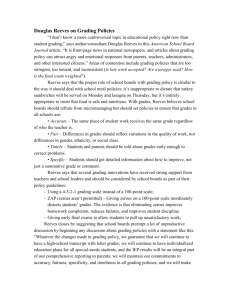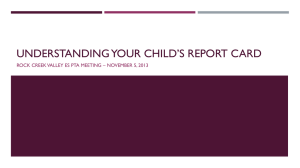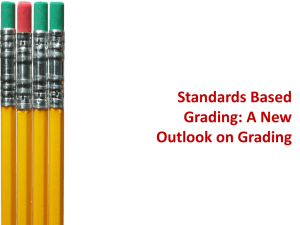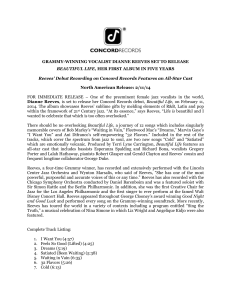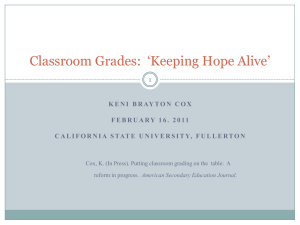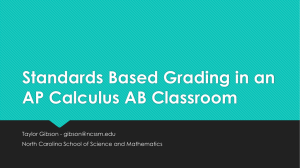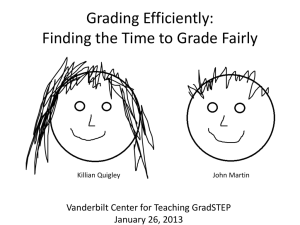Power Point Presentation
advertisement
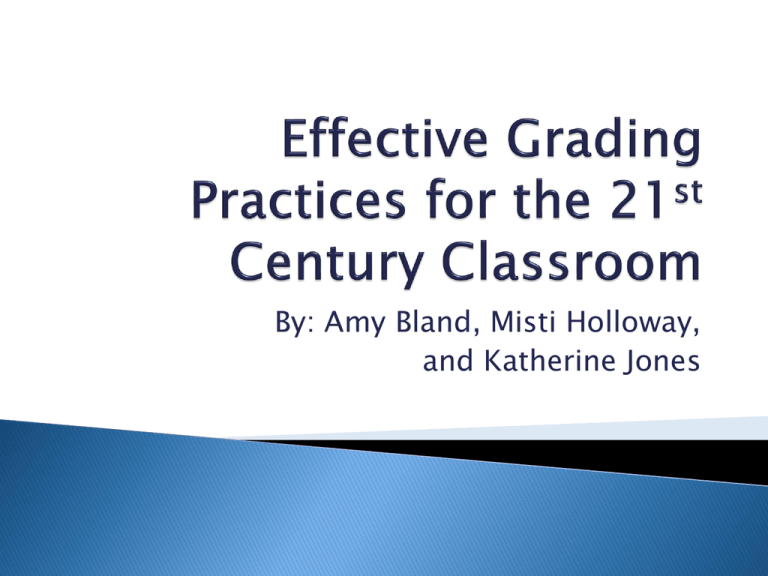
By: Amy Bland, Misti Holloway, and Katherine Jones Ineffective Grading Practices ◦ Zeros Effective Grading Practices ◦ Tutoring ◦ Dropping the lowest grade ◦ Opportunities to correct assignments/tests Assessment for Learning (AfL) Zeros—What effect do these grades have on student worth and achievement? Students are worth more than a zero and we as educators should value their efforts even if a day late. “The difference between failure and the honor roll often depends on grading policies of the teacher” (Reeves, D.(2008) Leading to change/effective grading practices. Educational Leadership.) What are we really telling a student they are worth? Is there any reason to try? It is difficult to recover from a zero. Assignment is… 1 day late 90 2 days late 80 3 days late 70 5 days late 60 Never 50 This encourages the student to complete work and not accept being worth 0! Practices vary greatly among teachers in the same school. (Reeves, 2008) The student would miss school events until the late work is turned in. Consequences are established. Zeros are not acceptable practice Our goal is complete work. “ Giving a zero on a 100 point scale for missing work is a mathematical inaccuracy.” (Reeves, 2004) Students can lose privileges instead of receiving a zero until work is completed. The assignment must be completed and turned in for proficiency. “Threats of failure do not work for students” (Reeves, 2204, p. 325). What is the lowest possible grade on the 100 point scale? The numerical value of a D which is a 60. Just 2-3 zeros can cause failure for a semester. 2-3 failures can cause a student to drop out of school ( Reeves, 2004). Tutoring/Review Sessions and Materials • Study Guides—Structured means for students to determine how well they understand class content • Practice Tests—Help review concepts in another structured format Dropping the Lowest Grade Opportunities to correct assignments/tests Process of Completing Corrections Assessment procedures that offer more meaningful information and purpose for the practitioner and learner encourage and enhance the learning process (Atkin, Black, Coffey, 2001; Stake, 1998; 1999). Measures that simply provide ranking information may be counterproductive, as the focus seems to have shifted from learning to test-taking skills (Perlman, 2003). The sharing of learning goals/intentions with pupils helping pupils know and recognize the criteria for success Providing feedback marking that helps pupils to identify how to improve learning self-assessment techniques to discover areas they need to improve The use of effective questioning to assess progress both the teacher and pupils by reviewing and reflecting on pupils' performance and progress setting targets for improvement Sharing Learning Goals/Intentions Clear success criteria-written or verbal Using consistent feedback and marking strategies Pupil self assessment and peer self assessment Using effective questioning Target setting Black, Harrison, Lee, Marshall, & Wiliam, (2003) Learn how effectively and easily to use anecdotal notes. Learn the best practices that are aimed at learning targets. Learn to implement summarizes practices that develop critical thinking. Atkin, J. M., Black, P., & Coffey, J. (2001). Classroom assessment and the National Science Education Standards. Washington, DC: National Academy Press. Black, P., Harrison, C., Marshall, B., & Wiliam, D. (2003). Assessment for learning: Putting it into practice. New York, NY : Open University Press McGraw-Hill Education. Carifio, J. & Carey, Theodore. (2009, Nov/Dec). A critical examination of current minimum grading policy recommendations. High School Journal, 93(1), 23-37. Cherepinsky, V. (2011, April). Self-Reflective grading: Getting students to learn from their mistakes. Primus: Problems, Resources & Issues in Mathematics Undergraduate Studies, 21(3), 294-301. Fay, Charles H. & Gordon, Michael E. (2010). The effects of grading and teaching practices on students' perceptions of grading practices. College Teaching, 58(3), 93-98. Hadsell, L. & MacDermott, R. (2010, July). Grade dropping: Strategic behavior and student 'satisficing'. American Journal of Business Education, 3(7), 57-71. Perlman, C. (2003). Practice tests and study guides: Do they help? Are they ethical? What is ethical test preparation practice? ERIC Document (ED 48D062). Reeves, D. (2008, February). Leading to change: Effective grading practices. Educational Leadership, 65,(5), 85-87. Reeves, D. (2004, December). The case against the zero. Phi Delta Kappan, 86(4), 324-325 Stake, R. (1998). Some comments on assessment in U.S. education. Education Policy Analysis Archives, 6(14), 1-8.
